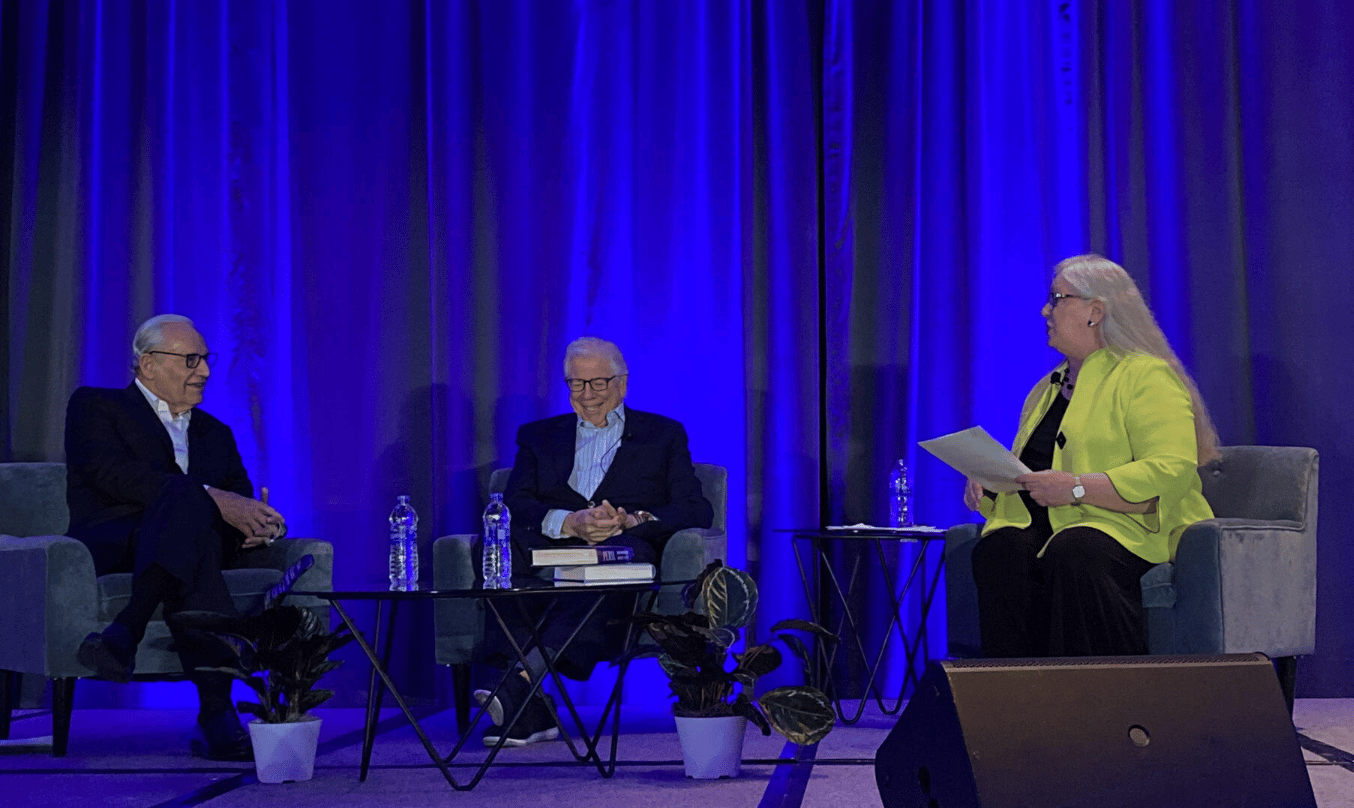
Not Fake News: Veteran reporters Bob Woodward and Carl Bernstein speak at The Society of Professional Journalists’ annual convention, MediaFest 2022 in Washington, D.C. (Photo by Rebecca Aguilar)
For Your Sins
(Exclusive.) Earlier this year, to mark its ethics week, the Society of Professional Journalists held a rather baffling contest titled “Spread Immoral News” (SIN). What could possibly go wrong?
The organization, which until recently was the largest and oldest professional journalism organization in America (that title now belongs to Investigative Reporters and Editors, IRE) encouraged college kids nationwide to create a newspaper issue where they violated as much of the SPJ’s Code of Ethics as possible.
You read that correctly: create fake news to highlight the reputational damage that can be caused by legitimately fake news, all the while tarnishing the very code that acts as the backbone of ethical journalism.
It was an initiative of the SPJ ethics chair, Michael Koretzky, who brought back to life an idea he first had a dozen years ago.

“If it had gone poorly or caused any misunderstanding on the campuses where it was done, then yes. I'd want to change enough things to make sure that didn't happen again,” Koretzky told Breaker. “But like I said, I've heard nothing negative from the winners or participants or the campuses on which they exist.”
But many SPJ members remain furious about the contest months after it was held.
"People already think we make it all up,” Dan Axelrod, a member, SPJ’s Ethics Committee, told Breaker. “Why would you create a program called Spread Immoral News on a national level that encourages college students, albeit for an educational basis, to make up news?”
Breaker has learned that SIN has now drawn criticism from another journalism body, condemning the concept. The backlash may adversely impact sponsorship of SPJ’s marquee annual event MediaFest 25, which is being held in Washington D.C. next month.
The feedback regarding the SIN initiative has reignited lingering discontent from members on issues that stretch beyond the controversial competition. A number of SPJ members have told Breaker that the problems within the organisation stem from a lack of leadership from SPJ president, Emily Bloch, who is a mentee of Koretzky and remains close with him.
"What's really sad is here is an organization that has hemorrhaged at least 2000 members according to SPJ insiders, and it's clouded by these controversies that are a distraction in helping journalists, including students, survive and thrive in a very challenging profession,” Rebecca Aguilar, former SPJ president, told Breaker.
SPJ’s membership (annual dues are currently $78.75) is down from around 5000 members just a few years ago to 3000, according to two people familiar with the situation.
Just weeks out from MediaFest, which is returning from a three-year hiatus, the event has not yet announced any major sponsors.
In 2022, the crowded event featured headline speakers such as Bob Woodward and Carl Bernstein, along with 60 Minutes’ Bill Whitaker and ABC News Correspondent John Quiñones. This year, the lineup is absent of any big names.
“We do have sponsors for MediaFest, and it hasn’t been any more difficult than usual to obtain sponsorships,” SPJ’s Associate Executive Director Jennifer Royer told Breaker.
Koretzky, who is in charge of MediaFest and is due to step down from his position next month, is scheduled to host a session at the multi-day event titled “Editor-in-Grief 1: Rule with an iron fist, wear a velvet glove.”
“You lead a newsroom of misfits, anarchists, and procrastinators. You’ve tried killing them with kindness, but when that didn’t work, you just wanted to kill them,” the description of the session reads.
“Instead of gentleness or genocide, try tyranny. Learn the 5 Rules of Ruling Well that will change your life and sleep patterns.”
But his fellow committee members aren’t amused.
"He has gone from firebrand to arsonist,” ethics committee member Chandra Bozelko told Breaker. “I'm finding it very hard to see how he is trying to protect the organization.”
“No one is going to let this happen again on a national level,” Axelrod told Breaker. “It's an embarrassment."
"The SIN initiative was never brought before the SPJ media ethics committee for a vote. It was vociferously protested, and many objections were raised, and it's unsurprising that industry trade publications, journalism professors, and members of the society would think that this is inappropriate."
Now the Association for Education in Journalism and Mass Communication (AEJMC) has asked its 2,000-plus members to vote on a resolution condemning SIN.
“Now, therefore, be it resolved that AEJMC and its membership go on record opposing any efforts to intentionally produce and distribute false or misleading content, even if designed to teach ethics,” the proposed resolution states.
For his part, Koretzky told us he thought the resolution was “funny.”
“First, SIN first happened in 2013 with a grant from the SPJ Foundation, and AEJMC said nothing then. Second, SIN last happened in April, without a hitch, so why wait five months to decry something that went well? Third, I didn't know about this resolution until someone else asked me about it.”
His mentee, Bloch, the SPJ National President, said she was “disappointed” in the AEJMC.
“The aforementioned SIN program is 12 years old,” Bloch said in a statement. “Our ethics committee director pitched a plan to revive it at a national scale as a way to introduce younger generations to the Code of Ethics after seeing success at a local level.”
“It was a learning exercise — nothing more. And it was thoroughly explained, along with a component to publicly view and vote for the winning issue. At the end of the day, I stand by the program and our decision to try something fresh.”
Subscribe to Breaker to read the rest.
To get full access, and see all of this week's stories and scoops, subscribe here.
Upgrade
